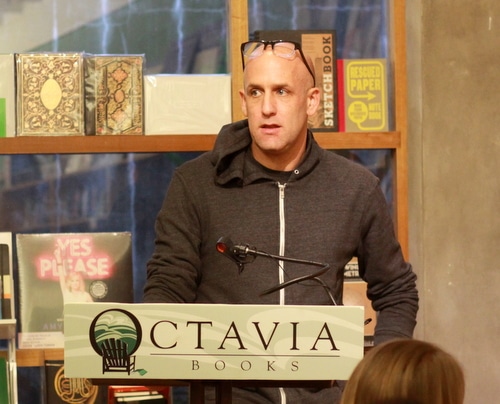
Author Ethan Brown answers questions after reading from his new book, “Murder in the Bayou,” on Wednesday evening at Octavia Books. (Robert Morris, UptownMessenger.com)
When journalist Ethan Brown began researching the interconnected, unsolved slayings of eight women in rural Louisiana for what would become his new book, “Murder in the Bayou,” he knew he had immersed himself in a chronicle of the abuse of police power and easily discarded lives.
What Brown didn’t know until much later, however, was that a central location in those women’s lives and deaths would lead him straight to a well-known employee of U.S. Rep. Charles Boustany, in a connection that is now drawing more attention than the unsolved murders themselves.
“That was a really surprising moment, to say the least,” Brown said. “I never imagined it would be someone who works for a Congressman.”
Brown — whose work has appeared in publications like Rolling Stone and The New York Observer and whose most recent book was the acclaimed “Shake the Devil Off” — began researching the unsolved killings of the women known as the Jeff Davis 8 in 2011. The women’s lives had veered into sex work at times, including sometimes within the Jefferson Davis Parish jail system, but they all had past arrests at an address in Jennings, La., that belonged to a now-closed motel called the Boudreaux Inn, Brown said.
The Boudreaux Inn, Brown learned, was notorious for a bar in the front where drug deals and sex acts would be negotiated and motel rooms in the back where they could be consummated, but Brown was also told that it was operated by someone powerful in the small community who went by the name of “Big G.” Through public-records searches, Brown learned that “Big G” was a nickname proudly sported by a well-known man named Martin Guillory — who was also a field worker for Boustany’s Congressional office, and he was also told that Boustany was a client of some of the women who were later killed, Brown said.
In May of 2016, Brown confronted Boustany and Guillory with his discoveries. Boustany vehemently denied any connection to the sex trade in Jennings, and dismissed Guillory from his staff, but the allegations have continued to draw attention amid Boustany’s bid for the seat held by retiring U.S. Sen. David Vitter.
“Congressman Boustany calls all of my reporting ‘lies,'” Brown told an audience at Octavia Books on Wednesday. “He says that he was unaware of his field rep’s involvement in this business, and since the publication of this book, his field rep has been terminated.”
In fact, while Boustany’s appearance in the book makes headlines (along with its overt similarities to the story woven in the first season of HBO’s acclaimed series True Detective), the Congressman’s involved in the reporting is somewhat tangential, Brown said.
“I’m not alleging or inferring in any way that Charles Boustany was involved in any of these murders,” Brown said.
The core of the book, Brown said, is about the pattern of slayings from 2005 to 2009 in which women were found dead, then dismissed by authorities as prostitutes, as if their lives were of little consequence — even though they had been deeply involved with law-enforcement officers, Brown said.
“The book is really like a chronicle of unconstitutional policing and police misconduct for like 40 years,” Brown said.
One important link between many of the women was that they were present at the scene of a raid by law-enforcement officers that ended with the shooting of an unarmed man, Brown said.
“Witnesses constantly say that these women were being killed because they saw something they shouldn’t have, and they mention a botched drug raid,” Brown said. “It has a lot of echoes to the Black Lives Matter era that we’re living in now.”
Ultimately, the book pieces together a theory of the slayings that Brown said is largely based off of interviews already conducted by various law-enforcement agencies; his contribution is simply putting the pieces together, he said. But why the police investigation was never brought to closure — whether it was intentionally thwarted, or simply inept — is beyond his ability to conclude.
“It’s stunningly incomplete. It’s packed with conflicts of interest. It’s also characterized by a lot of misconduct,” Brown said. “But what’s the intention of all this? I can’t speak to intention. I can only speak to what I see.”
The Jeff Davis 8 investigation is still being investigated by a task force led by the FBI and the sheriff’s office, and the parish elected a new sheriff in 2012 amid a heated election that included broad promises to make the case a priority. Those promises, however, have thus far been unkept, Brown said.
“I think the book makes a fairly compelling case about law-enforcement misconduct and where these cases might need to go,” Brown said. “I hope that’s paid attention to.”
To read our live coverage of Brown’s question-and-answer session at Octavia Books, see below.